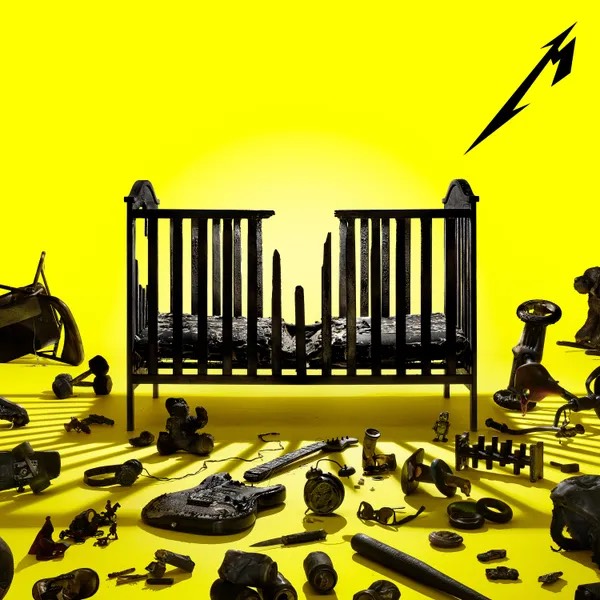Metallica’s Eleventh Studio Album “72 Seasons” Brings Back their Thrash Metal Style

Metallica’s eleventh studio album “72 Seasons” cover.
April 21, 2023
Considering that Metallica was my most-listened-to band of 2022 according to Apple Music, it is safe to say I got excited when the song “Lux Æterna” was released Nov. 28 of last year, foretelling a new album with it. However, it wasn’t until April 14 when Metallica released their full eleventh studio album “72 Seasons,” which is possibly their best album of the past two decades. With a total of 12 tracks, it certainly lived up to the hype it built for itself. And despite the flaws it does carry, I definitely don’t regret the 77 minutes I spent listening to it.
For many people, Metallica is the first band that comes to mind when thinking of metal music. Although having many popular albums in the 80s, it wasn’t until their 1991 self-named album, commonly referred to as “The Black Album,” that they truly became a household name. The album sold millions of copies around the world and is known for being their most successful. However, despite Metallica’s fame, they have been under particular scrutiny from fans ever since releasing their 2003 album “St. Anger” which completely differed from their music before and felt sloppy in comparison. Now, most of Metallica’s more recent albums are commonly criticized for reasons including mediocrity and being forgettable compared to their older songs.
However, “Lux Æterna,” the first song to be released on the album despite being the sixth track, was far from forgettable. It begins very suddenly with heavy electric guitar and swift drums pounding alongside, immediately setting the energetic tone that the rest of the album follows. And the intro only becomes better once the recognizable guitar riff enters the track. “Lux Æterna” truly signals Metallica’s return to their thrash metal roots. Also, the lyrics perfectly match the instrumentals as they carry an uplifting, vibrant message about “[casting] out the demons that strangle your life” and “never [being alive] more than right here tonight.” When I listened to it for the first time after school, I didn’t really have anything bad to say about it. I still don’t. It’s short, sweet and was really just an exciting song to introduce the “72 Seasons” album with.
One of the more unique sounding songs on the album is the ninth track, “If Darkness Had a Son” which takes on a much heavier beat to it. With lyrics such as “paint your eyes as black as sorrow” followed by “hide yourself behind tomorrow,” it becomes clear that this song, unlike “Lux Æterna,” revolves more around tragedy. The gloom of “If Darkness Had a Son” is especially well reflected by the guitar. While there is in fact a riff repeated throughout the song, it isn’t super driven. It dwells. It’s mournful. “If Darkness Had a Son” stands out in the album for embracing the less exciting parts of life without feeling too slow or dragging.

I will say, there are a few aspects of “72 Seasons” that the album struggles with, specifically the length of songs. There are several songs over six or seven minutes long which isn’t a problem in itself, for the issue lies more with how the long songs don’t contain much development. Let me elaborate. In Led Zeppelin’s “Stairway to Heaven,” the song slowly gets faster and more upbeat. In Guns N’ Roses’s “November Rain,” there are a variety of guitar parts and it ends in a completely different mood than it began. In Green Day’s “Jesus of Suburbia,” there are several movements that completely switch styles. And even in Metallica’s own “Master of Puppets,” the middle section builds up to an amazing guitar solo. In order for a long song to not become too repetitive, something needs to greatly change as time progresses. The album’s namesake song and first track “72 Seasons” somewhat falls into the trap. While being an overall decent song, there isn’t much that noticeably alters considering it is almost eight minutes.
Along with song length that can get a bit weird, the “72 Seasons” album has some songs with lyrics that feel a bit too straight forward. And the phenomenon is odd since Metallica has written some great, metaphorical lyrics many times before. For instance, in the previously mentioned song “Master of Puppets” released back in 1986, the line “chop your breakfast on a mirror” serves as a reference to drug abuse. In fact, the entire song is about how drugs can take over and then destroy somebody’s life. But the key is that it’s also open to interpretation. However, the third track of “72 Seasons,” “Screaming Suicide,” has lyrics that directly talk about the subject matter. Suicide and mental illness can be a very heavy topic to tackle in music so I applaud Metallica for doing it. I just wish it was more subtle, allowing the listener to be guided to the meaning instead of having it so blunt. Music is beautiful because each person walks away with a different message and there are a few songs such as “Screaming Suicide” which don’t really allow for deep thought.
So sure, Metallica’s “72 Seasons” isn’t one of their top albums, but it is far from their worst. I really am impressed that the band managed to make the album a mashup of their more modern and 80s music, creating a whole new style as a result. It is also clear that particularly Lars Ulrich, Metallica’s drummer who has faced lots of criticism from fans for his skills, has been practicing so hard for this moment. So thanks to him, James Hetfield, Kirk Hammett and Robert Trujilo, we have a new Metallica album to appreciate.



